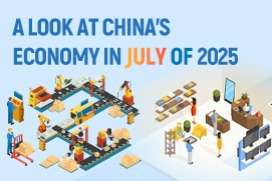Big names roll out benefits measures for delivery employees


Chinese technology heavyweight Alibaba Group and financial tech company Ant Group announced on Monday the launch of a plan aimed at providing better benefits guarantees and stimulus measures for delivery riders, as part of a broad push to safeguard the rights and interests of riders.
Industry experts said the move is expected to promote the healthy and orderly development of the platform economy. They added that major food delivery platforms should shift their focus from providing massive subsidies and huge discounts to improving the quality of services and delivery efficiency.
The plan includes offering more support to riders and their families, covering special rewards, educational improvement, healthcare assistance and career development. All of the delivery riders on Alibaba's platforms will enjoy such benefits.
Ele.me, the food delivery platform of Alibaba, has invested more than 20 million yuan ($2.8 million) for over 600 family members of riders who have serious illnesses and has provided educational assistance to more than 400 riders and their children.
The welfare policies have come after major food delivery platforms, including Ele.me, Meituan and JD, vowed to rein in aggressive discounting practices, oppose disorderly and vicious competition and foster a win-win ecosystem earlier this month.
The State Administration for Market Regulation summoned the food delivery platforms in July, urging them to regulate their promotional activities and engage in rational competition.
The regulator called on the platform companies to strictly adhere to e-commerce, fair competition and food safety laws, and assume more professional responsibility, while fostering a healthy ecosystem that benefits consumers, merchants, delivery riders and platform operators, so as to promote the regulated, healthy and sustainable development of the catering services sector.
On July 1, a meeting of the Central Commission for Financial and Economic Affairs stressed efforts to advance the building of a unified national market and regulate enterprises' disorderly price competition in accordance with laws and regulations.
Since May this year, many local catering associations have issued documents calling on food delivery platforms to stop "involution-style" competition.
Jiang Han, a senior analyst at market consultancy Pangoal, said it is important to safeguard a fair and orderly market environment and curb "involution-style" competition in the food delivery sector, which is experiencing a prolonged price war.
He said competition in China's instant retail sector is intensifying as major platforms have stepped up subsidies to compete for market share, leading to the compression of merchants' profits and the decline in consumer experience, adding that they should pool more resources into safeguarding the interests of riders and merchants, and improving food safety.
Meituan announced in July that it will upgrade the guarantee for riders. The pension insurance subsidy will be rolled out nationwide by the end of this year, and it is expected to cover over 1 million riders. Since July 1, the coverage of work-related injury insurance for riders has been expanded to 17 provinces and municipalities, the company said.
JD said it will invest 2 billion yuan to upgrade benefits for its full-time riders. In addition to providing full-time food delivery riders with comprehensive social insurance and housing funds, special allowances will be given to full-time riders each month during the summer and winter. By the end of the second quarter, the number of JD's full-time delivery riders exceeded 150,000.
Cao Lei, director of the Internet Economy Institute, a domestic consultancy, said food delivery platforms should step up investments in technologies such as artificial intelligence-powered algorithms and intelligent scheduling to enhance fulfillment efficiency, while optimizing supply chain management and improving the welfare of delivery staff.
According to a report from the Chinese Academy of International Trade and Economic Cooperation (CAITEC), the market scale of China's instant retail sector reached 650 billion yuan in 2023, up 28.89 percent year-on-year. The figure is expected to surpass 2 trillion yuan in 2030.
Instant retail is regarded as an important development direction for the retail sector in the future as enterprises can expand their scope of services, enhance user stickiness, and leverage their existing logistics and supply chain advantages to explore new growth points through instant retail, said Hong Yong, an associate research fellow at the CAITEC.
Hong emphasized that efforts should be made to provide differentiated high-quality services, such as enhancing food safety standards and reinforcing after-sales services, thereby creating a healthy competition environment and promoting the high-quality and sustained development of the food delivery sector.
fanfeifei@chinadaily.com.cn




































